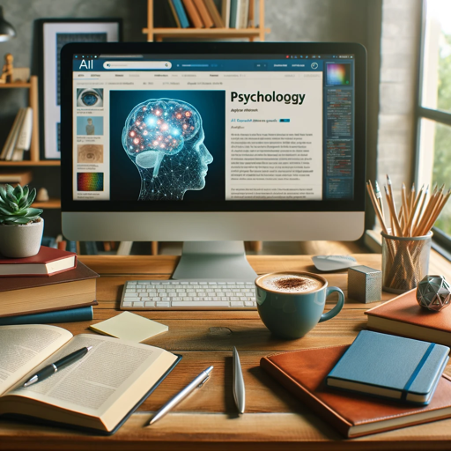Can AI write a psychology book?
This question captured my imagination for quite some time. As a psychologist deeply immersed in both the intricacies of the human mind and the rapid advancements of technology, I found myself standing at a crossroads of psychology and technology.
I'm excited to share with you the story behind my book: "The AI's Guide to Psychological Well-Being," a self-help book co-written with Chat GPT! The journey began with a long-standing aspiration to create a guide that could assist people in navigating the complexities of psychological well-being. With my background as a practicing therapist, I am fortunate to have insights into several new techniques, practical tips, and the latest research in the field. My goal was to compile this knowledge into a handy, accessible guide that could benefit anyone on a daily basis. But, as life would have it, other responsibilities kept pushing this project to ‘sometime in the future’.
Then, something intriguing caught my attention around November 2022: Chat GPT by OpenAI. I was instantly captivated by its ability to produce human-like writing, and by the sheer breadth of information it could handle. Experimenting with it, asking psychology-related questions to test its accuracy in a field I'm well-versed in, I found that it could indeed generate useful and easy-to-understand texts. This discovery opened up new possibilities.
Venturing into Uncharted Territory
As I delved deeper, I realized that while there were numerous AI-written novels, there seemed to be a gap in AI-authored books on psychological topics. This was my chance to bridge that gap. However, embarking on this project meant considering several factors.
Firstly, this was not just about publishing a book; it was a proof-of-concept project. The content generated by Chat GPT was a collection and remix of information available on the Internet. My role evolved into that of editor rather than sole author. As per OpenAI's guidelines, the language model couldn't be credited as an author, but rather, it acted as a co-author, assisting me in gathering and organizing content.
One crucial aspect I focused on was the accuracy of the information relating to mental well-being. I scrutinized every piece of advice for scientific validity. It was essential to adhere to the ethical principle of 'not causing harm,' especially given the sensitive nature of mental health. Thus, while the book serves as an informative guide, it is not intended as a substitute for professional mental health advice.
The creation of this book was a meticulous and thoughtful process. It began with a simple question to the AI, "Can you write me a book on psychological well-being?" The response was a foundational outline, which I then expanded with titles, subtitles, and additional queries to explore nuances and complexities. The entire text underwent thorough review and editing, ensuring consistency in style and scientific accuracy. This was more than just compiling AI-generated responses; it was a matter of shaping and refining the content to make it meaningful and coherent.
A Closer Look Inside the Book
"The AI's Guide to Psychological Well-Being" aims to demystify psychological well-being and provide practical tips for everyday life. It is crafted for those looking to enhance their mental health and for anyone seeking insights into a more fulfilling life. The book covers a wide range of topics:
- Understanding Psychological Well-Being: The first part of the book challenges common myths and provides a solid foundation for what constitutes true mental health.
- Strategies for Everyday Life: Here, the book offers practical, easy-to-implement advice on managing stress, nurturing healthy relationships, and building positive habits.
- Navigating Emotional Challenges: This section focuses on how to handle difficult emotions and develop resilience against life’s challenges.
- The Quest for Purpose: The book delves into the quest for meaning in life, encouraging readers to discover and pursue their passions and purposes. (This was very interesting for me, as it was one of the first times an AI model was reflecting on fundamentally human concepts of meaning and purpose).
How to design a book cover?
The cover of the book was crafted using none other than OpenAI's DALL-E 2, an AI model that generates images based on text input. It is a visual representation of AI's interpretation of psychological well-being. The prompts I used – 'psychological well-being, digital art, bright and hopeful' – resulted in a cover that not only encapsulates the essence of the book but also showcases the capabilities of AI in understanding and depicting human concepts.

Credit: Image generated by OpenAI's DALL-E
Reflections on AI in Psychology
The process of creating the book was astonishingly quick, taking about a week to produce a raw text draft. This efficiency is significant for public mental health, as it demonstrates the potential of AI in quickly synthesizing vast amounts of information into accessible formats.
My hope is that this book will not only serve as a helpful guide for those seeking to improve their psychological well-being, but also inspire further exploration of the responsible use of technology for the greater good. In my professional life, I work as a university lecturer, and as an EMDR and schema therapist in my private practice. I teach at Leiden University's Department of Developmental and Educational Psychology. Here, I also supervise a research project delving into various facets of Early Maladaptive Schemas. This role allows me to stay at the forefront of current psychological research and education.
In addition to my academic responsibilities, I am deeply invested in exploring the responsible use of AI in research and science communication. This interest has led me to engage in discussions and deliver speeches at institutions such as Erasmus University Medical Center. Here, I share my perspectives on responsible AI use, drawing on my experiences in psychology and technology.
Looking to the Future
As we move forward, the integration of AI into various fields, including psychology, presents both opportunities and challenges. The potential of AI to revolutionize the way we approach mental health and well-being is immense. It offers a new dimension of accessibility and efficiency in disseminating knowledge and tools for psychological support. However, this journey also calls for a cautious approach, balancing technological advancement with ethical considerations and the deeply personal nature of psychology.
AI's capacity to process and generate information on an unprecedented scale is both its strength and a potential pitfall. In the realm of psychological research and literature, the accuracy of information is paramount. This is where rigorous fact-checking and data verification come into play. AI can provide a wealth of information, but it is essential to cross-reference this data with credible sources.
Moreover, while powerful, AI lacks the nuanced understanding that comes naturally to humans, especially in the context of psychological complexities. Human oversight in AI-generated content is not just a step in the process; it is a necessity. It involves assessing AI's output for relevance, ethical considerations, and alignment with psychological principles. This oversight ensures that the content is not only accurate but also empathetic and sensitive to the diverse experiences of individuals.
The correct use of AI in psychology is not about replacing human expertise but augmenting it. AI can handle vast quantities of data, identify patterns, and suggest new areas of exploration. However, the human touch is irreplaceable in interpreting these findings, applying ethical judgment, and ensuring the content resonates on a human level.
Disclaimer: This blog piece was augmented by OpenAI’s GPT 4 model.
Credit banner: Cevdet Acarsoy, 2023.


